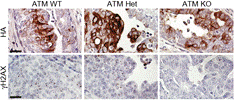Veterinary and Biomedical Sciences, Department of
Document Type
Article
Date of this Version
2011
Citation
International Immunology (2011) 23(12): 729-739. DOI: 10.1093/intimm/dxr084.
Abstract
We had previously reported that Acanthamoeba castellanii (ACA) contains a mimicry epitope for proteolipid protein 139–151 capable of inducing central nervous system (CNS) autoimmunity in SJL/J mice. We now present evidence that ACA also contains a mimicry epitope for myelin basic protein (MBP) 89–101, a derivative from amoebic nicotinamide adenine dinucleotide dehydrogenase subunit 2 (NAD). The epitope, NAD 108–120, contains a discontinuous stretch of six amino acids in the core region (VVFFKNIILIGFL) sharing 46% identity with MBP 89–101 (VHFFKNIVTPRTP; identical residues are underlined). SJL mice immunized with NAD 108–120 develop encephalomyelitis similar to the disease induced by the cognate peptide. We demonstrate that NAD 108–120 induces T cells that cross-react with MBP 89–101; the antigen-sensitized T cells, which produce predominantly T helper (Th) 1 and Th17 cytokines, transfer disease in naive SJL recipients reminiscent of the disease induced with MBP 89–101. This is the first report to demonstrate that a solitary microbe can induce CNS autoimmunity by generating cross-reactive T cells for multiple myelin antigens.
Included in
Biological Phenomena, Cell Phenomena, and Immunity Commons, Medical Biochemistry Commons, Medical Molecular Biology Commons, Nervous System Diseases Commons



Comments
Published for the Japanese Society for Immunology by Oxford University Press, 2011. Used by permission.